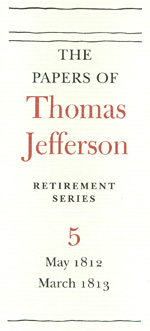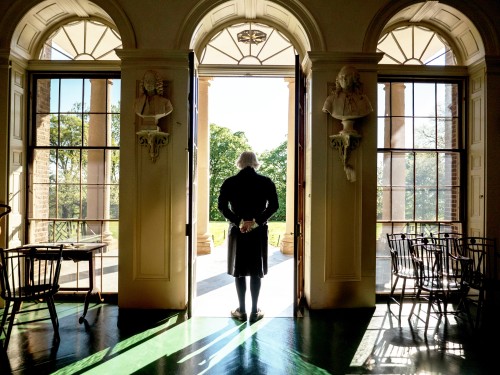 The 592 documents in this volume span the period from 1 May 1812 through 10 March 1813. In addition to managing his plantations in Albemarle and Bedford counties, Thomas Jefferson devoted himself to the needs of family and friends, read widely, and carried on an extensive correspondence regarding the arts and sciences, agriculture, technology, business and legal issues, politics, and war. The impending conflict with Great Britain and the American declaration of war on 18 June 1812 provided opportunities for Jefferson and his fellow Republicans to justify the conflict and excoriate anti-war Federalists. Jefferson alternated between counseling moderation and reconciliation within his own country and making bellicose pronouncements, such as his suggestion that if Britain bombarded New York or Boston, America should recruit discontented British incendiaries to burn London. With the war's onset, expansionists like Jefferson underestimated the difficulty of annexing Canada to the United States. A grim realization slowly emerged that the War of 1812 would neither be smoothly executed nor end quickly, as Isaac A. Coles's remarkable year-end letter from the Canadian front shows. Jefferson's transmission of Coles's letter to President Madison exemplifies the former president's continuing role in public policy questions, but Jefferson had no desire to return to Washington, as some of his admirers proposed.
The 592 documents in this volume span the period from 1 May 1812 through 10 March 1813. In addition to managing his plantations in Albemarle and Bedford counties, Thomas Jefferson devoted himself to the needs of family and friends, read widely, and carried on an extensive correspondence regarding the arts and sciences, agriculture, technology, business and legal issues, politics, and war. The impending conflict with Great Britain and the American declaration of war on 18 June 1812 provided opportunities for Jefferson and his fellow Republicans to justify the conflict and excoriate anti-war Federalists. Jefferson alternated between counseling moderation and reconciliation within his own country and making bellicose pronouncements, such as his suggestion that if Britain bombarded New York or Boston, America should recruit discontented British incendiaries to burn London. With the war's onset, expansionists like Jefferson underestimated the difficulty of annexing Canada to the United States. A grim realization slowly emerged that the War of 1812 would neither be smoothly executed nor end quickly, as Isaac A. Coles's remarkable year-end letter from the Canadian front shows. Jefferson's transmission of Coles's letter to President Madison exemplifies the former president's continuing role in public policy questions, but Jefferson had no desire to return to Washington, as some of his admirers proposed.
As the war unfolded, Jefferson received an unusually large number of requests for letters on behalf of military and governmental job applicants. With varying degrees of enthusiasm, he often agreed to help these men, some of whom he knew, but others of whom were total strangers. The exigencies of war stimulated American arts, technology, and manufactures. A colorful assortment of authors and inventors also asked Jefferson for his influence and patronage. He responded with insightful assessments of the wide-ranging projects described to him. In order to meet plantation cloth needs, Jefferson enhanced his domestic textile production by acquiring the latest machinery. Whether ordering spinning machines, cataloging his library, making a distribution list for slave blankets, keeping meteorological notes, or amassing legal evidence, Jefferson continued to pay methodical, detailed attention to recordkeeping.
Jefferson expended considerable time on his legal troubles. A new dispute with David Michie over land in Albemarle County nearly culminated in a duel between Michie and Jefferson's agent Craven Peyton. Jefferson's ongoing controversy with Samuel Scott over the ownership of approximately fifty-five acres in Campbell County was apparently even more galling to Jefferson, who privately denounced Scott's idle mind and "beastly drunkenness." Taking frequent notes on this legal case, the former lawyer accumulated copious evidence and carefully prepared his answer to Scott's bill of complaint. Regardless of his anger at the elder Scott, Jefferson graciously wrote a letter of introduction to the secretary of the navy for his son, Beverly R. Scott.
During this period Jefferson learned of the deaths of George Jefferson and Joel Barlow. He read of his cousin's death in an August 1812 newspaper before receiving a detailed account of the ailing man's final days from family friend Fontaine Maury. Answering Maury, Jefferson predicted that the loss would stir "deep & long regret," but he advised "resignation" in response to a grief-stricken letter from George Jefferson's partner Patrick Gibson, who succeeded him as the ex-president's agent in Richmond. Later that year Joel Barlow, minister plenipotentiary to France, was caught up in the chaos of Napoleon's retreat from Russia and died in what is now Lithuania. The "excellent Barlow" was mourned in a February 1813 letter from Pierre Samuel Du Pont de Nemours that enclosed an obituary on which he collaborated with Konrad E. Oelsner. Jefferson in turn forwarded this tribute to the Richmond Enquirer for publication.
Jefferson was accessible to a diverse spectrum of the educated American public. From Norfolk, Thomas Williamson wrote asking Jefferson to settle a bet about whether the former statesman had ever been to London and met the king, and Jefferson duly replied in the affirmative. He received two anonymous letters from a correspondent who persisted in recommending books that would help Jefferson convert to Christianity. If others had doubts about his religion, Jefferson himself did not fail to contemplate his own mortality. He advised William Duane that "the hand of age is upon me" and that his faculties were gradually failing. Later he declined to subscribe to an American edition of Macklin's Bible, because "age and infirmity warn me from engaging in new undertakings which will require for their completion more years than I have to live." Jefferson lived for more than thirteen years after making these pessimistic statements.
Volume 5 available through:
UVA Press Rotunda (index included; subscription required)
Founders Online (index omitted; no subscription required)
COPYRIGHT NOTICE: Published by Princeton University Press and copyrighted, ©, by Princeton University Press. All rights reserved. No part of this book may be reproduced in any form by any electronic or mechanical means (including photocopying, recording, or information storage and retrieval) without permission in writing from the publisher, except for reading and browsing via the World Wide Web. Users are not permitted to mount this file on any network servers.
